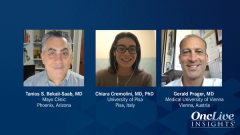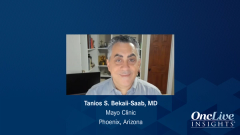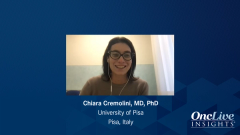
Selecting Frontline Therapy for Newly Diagnosed mCRC
Tanios S. Bekaii-Saab, MD, presents the case of a 65-year-old woman with stage IV adenocarcinoma of the rectum, and the panel reviews frontline treatment options for a patient with newly diagnosed mCRC.
Episodes in this series

Tanios S. Bekaii-Saab, MD: We’re going to move on to our first case. This is a 65-year-old woman who presents with a 3-month history of bloating and abdominal cramping and a 7-pound unintentional weight loss but not much of a past medical history. In the emergency department, scans show mass that appears to be rising from the rectum and lesion suspicious for metastases in the peritoneum and the lungs. She was admitted, and a colonoscopy confirmed the presence of this rectal mass. A biopsy was read as adenocarcinoma, consistent with a rectal primary. Molecular testing revealed a microsatellite-stable tumor, but there was a mutation in KRAS and G13D and then of course, BRAF wild type, with no findings of significance. Unfortunately, this was a stage IV adenocarcinoma rectum involving the peritoneum and the lung. There was a decent performance status. How do we treat? Chiara, I’m going to start with you. When you see a patient such as this 1—65 years old, relatively good performance status—what factors do you consider when choosing the treatment? What would that treatment look like for you?
Gerald Prager, MD: In this patient there are some KRAS mutations, so anti-IGF antibodies aren’t an option. You would combine chemotherapy plus bevacizumab, for sure. In a fit patient, you have the decision whether to go for a chemotherapy doublet or a triple-chemotherapy combination with bevacizumab. That’s the question. Also, how is the tumor burden? Is there an impending threat of ileus obstruction of the gut? If you aim for a response, I’d go for a chemotherapy triplet in this patient: modified FOLFOXIRI [5-fluorouracil, leucovorin, oxaliplatin, irinotecan] plus bevacizumab, because this is a rather young and fit patient [INAUDIBLE]. If it’s an indolent disease, sometimes it’s difficult to tell in the beginning of the diagnosis. You could go for a chemotherapy doublet and combine it with bevacizumab. I’d be interested to know whether this is an mucinous subtype. It is most likely, I would assume, with the adenocarcinosis..
Tanios S. Bekaii-Saab, MD: We’re assuming it’s mucinous.
Gerald Prager, MD: If it’s mucinous, I’d rather go for a triplet combination in this patient.
Tanios S. Bekaii-Saab, MD: Chiara, back to you. Same question, and I’ll add a little. If this patient was actually a RAS wild type, would that change? But first let’s take this scenario. Tell me your thoughts, and then your thoughts in case this actually ended up a wild type.
Chiara Cremolini, MD, PhD: I mostly agree with Gerald. In the absence of a clearly symptomatic primary tumor, I will go for up-front systemic therapy. In the case, the systemic therapy is a chemotherapy plus bevacizumab. This is an aggressive disease because metastases were diagnosed synchronously with the primary tumor, and we have widespread disease with the peritoneal carcinomatosis. This is why I would choose up-front treatment plus bevacizumab if the clinical conditions of the patient allow for this as a first-line option. Even a conversion to resectability is not the objective of the treatment in this case—because we have a diffuse disease with lung and peritoneal metastases—this is still a widespread disease. The risk of imminent deterioration due to the peritoneal carcinomatosis is a good reason for me to intensify the up-front chemotherapy backbone.
In the same case, but with RAS and BRAF wild-type tumor and the microsatellite stable tumor, I could change my mind because I could go for chemotherapy plus anti-EGFR in the first line. This is a left-sided tumor. For sure, I’d also like to know HER2 [human epidermal growth factor receptor 2] status, because in the case of HER2 amplification, anti-EGFR and monoclonal antibodies are not my first choice. But even the in absence of this information, for a left-sided RAS and BRAF wild-type tumor, I’d go for a chemotherapy and an anti-EGFR. In this case the data with the triplet are less solid, less robust than in combination with the antiangiogenic. So a doublet of 5-FU [5-fluorouracil]–based chemotherapy is the most evidence-based choice in this case.
Tanios S. Bekaii-Saab, MD: Gerald, if this was a RAS wild type, do you agree? Would you switch strategies? Assuming it’s mucinous, assuming it’s HER3 non-amplified, would you switch strategy from a triplet to a doublet plus anti-EGFR?
Gerald Prager, MD: Yeah, I absolutely agree. This is based on a big randomized prospective clinical data like…the FIRE-3 trial. I totally agree with Chiara. In the left-sided primary RAS wild type, I’d go for a chemotherapy doublet plus anti-EGFR.
Tanios S. Bekaii-Saab, MD: I’ve become a big fan of triplet plus bevacizumab, especially with TRIBE-2 giving us a good view of a maintenance strategy following intensive therapy. I’ve felt much more comfortable using the triplet, and I use it more in patients who are relatively young. I mean, 70 is still relatively young in our patient population.
Transcript Edited for Clarity









































